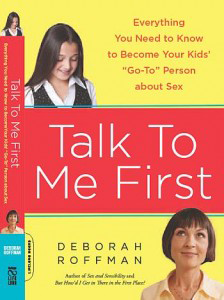Vicky Kelman
Talk to Me First: Everything you Need to Know to Become Your Child’s “Go-To” Person About Sex
by Deborah Roffman
Watched a sporting event live on TV recently together with a child? What did you do when the ad for Cialis came on? Change the channel? leave the room to get a snack? go to the bathroom? raise your voice very loud and try to start a diversionary conversation.? And just as you think you’ve dodged the bullet, the same commercial returns! (Those commercials do not come on just once.)
If you’d read “Talk to Me First,” this scene might hold less fear and perhaps (I know this sounds far-fetched) more opportunity.
 This book is a “must-read” for everyone who comes in contact with kids. It is addressed to parents but, to the extent that we strive to have home and school act as partners in the raising of our children, and to the extent that kids spend increasing numbers of hours in school as they mature, this book is a must read for educators (and, I include rabbis, cantors, youth group leaders and camp staff in the category “educator”).
This book is a “must-read” for everyone who comes in contact with kids. It is addressed to parents but, to the extent that we strive to have home and school act as partners in the raising of our children, and to the extent that kids spend increasing numbers of hours in school as they mature, this book is a must read for educators (and, I include rabbis, cantors, youth group leaders and camp staff in the category “educator”).
Roffman holds the optimistic view that adults can be “proactive nurturers” of their children around issues of sexuality, able to stay ahead of the problematic and toxic messages about sexuality from media, advertising, pop culture and peer pressure that seem to be bearing down on us all IF they can shake off their fear (which she describes as related to the same flight or fight response we might have when coming face-to-face with a bear in the woods ), make a deep breath and focus on the child’s needs rather than on our own feelings.
“Human Sexuality: It’s not about sex,” is the title of a course she teaches to seventh graders. This title hints at her stance that we concentrate so much on the “sex” part of sexuality that we forget that education about sex is education about life — and that is something parents do know a lot about.
As parents, we don’t get to “decide we are too uncomfortable to parent….there are no free passes and no rationalizations that get us off the hook. And besides, having the courage to say ‘I’m really embarrassed, and I am going to talk about this anyway is the best kind of modeling we can offer our kids.” (p.c 12)
How we parent around issues of sexuality should be consistent with how we parent about everything else. Kids have five needs, Roffman writes. Just five. This means, parents have five jobs. (She calls this “the parent’s five-piece suit.” Put it on — and you are ready for everything, even that most dreaded topic.
- Affirmation is made up of attention, acceptances and validation ( I “Get you.” “I see you.” “I love you.” “I know you.”
- Information: we pass on wisdom, skills and “know-how,” what they need to know to be safe, answers to their questions
- Values: to guide their lives by: good and bad, dangerous and safe, important and not, appropriate and inappropriate
- Limits and boundaries: think “crib” for a baby, the maximum amount of freedom a baby can have without an adult in the room; how and when to widen the boundaries and when to remove them? When to let our kids fly and when to tie them down; (Without this part of the suit, the other 4 pieces won’t work.)
- Guidance : thinking through, picturing and preparing for what’s next; peering ahead to see what might happen ; ( pp 47-50)
Roffman teaches us that this same five-piece-suit will serve us well as we wade into the murky waters of topics we’re uncomfortable with and would rather not face. Take a deep breath, put aside YOUR feelings and ask yourself, ” where are my child’s needs around this-tough-question- she’s-asking-me-that-I-think-she’s-too-young-to-talk-about-and-I-am-not –ready-for”
And “everything in this book applies directly to kids who are sexually ‘different.’ The same core needs always apply. Kid who are LBGTQ just may need extra layers of information, clarity about values, limit-setting and/or anticipatory guidance.” (p. 210)
Searching for the values portion of that 5-piece suit? As I read this lovely and funny book, I felt these Jewish values bubble up, among others. (You can probably add to this list.)
- The world was created for us (human beings)
- we are God’s partners in creation which means we have responsibility for taking care of the earth and each other
- Humans alone are created in God’s image
- Our bodies are holy because God created them ( and the body contains the soul )
- The power to conceive children is a blessing from God
These are the values that can be part of our “5-piece-suit” as we talk with kids, explore with them and guide them. Almost every dilemma, question, situation that your child or student can bring you (if you have situated yourself to be the “go-to” person) will be clarified if you can use these values as a lens through which to view it.
It’s my impression that our Jewish schools do a great job on teaching a narrow range of Jewish values. ( Every kid who has had any Jewish education at all, probably knows Tikkun Olam and
Tzedakah.) Are the ones I listed above, which have such potential impact on relationships, present and future, ever talked about? They all come right from Genesis chapter one…a story we teach over and over. What is being taught when kids study that text? Is the what and when and sequence of the seven days of creation the sum total of what the Torah, passed on all these generations, has to teach us?
One of the things I got from Roffman is that to the extent that sexuality is part and parcel of being human, it needs to be “on the table” (potentially, at least) all the time. The values we choose to highlight when we teach Genesis chapter one provide an opening for a conversation or lay the groundwork for a future conversation in the same way that using correct anatomical terms for body parts does, or reflecting together about a news article or a TV show can. It’s all of a piece, it flows. As I heard someone say recently, “Don’t have ‘the talk,’ have a conversation.”
The last section of this book contains lots of scenarios for practice (pp. 226-240). It may be hard to imagine yourself and/or your child in some of these situations, but many of them will come your way. So take advantage of the preview! Following the practice scenarios there is a rich list of resources (books, internet sites) and a section with a review of basic anatomical facts of the reproductive system
And Roffman wisely adds this reassurance: “Parenting is always a do-over,” (p 118) by which she means that you always have another chance to re-visit the conversation that didn’t “go” for you or your child.
See what I mean about the opportunity offered by the Cialis commercial in the middle of the World Series?
________________________
I recommend Roffman’s other two books, as well:
- “But How’d I get in There in the First Place?” Talking to your Young Child about Sex
- Sex and Sensibility: The Thinking Parent’s Guide to Talking Sense about Sex


